Japanese is often considered one of the most difficult languages in the world, but for native Japanese speakers, English can feel just as challenging. From pronunciation and grammar differences to the difficulty of memorizing vocabulary, Japanese learners of English face several obstacles. Let’s take a closer look at why English is so difficult for Japanese speakers.
1. The Sounds Are Completely Different
① Japanese Has Only 5 Vowels, While English Has More Than Twice That!
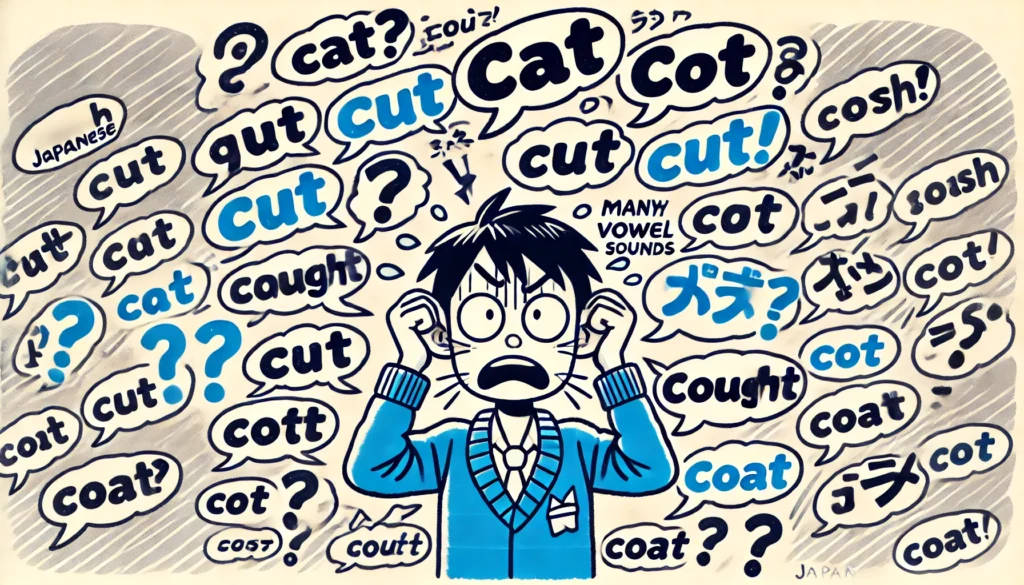
① Japanese Sounds Are Simple, but English Has an Overwhelming Variety!
Japanese has only five vowels (a, i, u, e, o) and a limited number of consonants. In contrast, English has 14 to 20 vowel sounds and 24 consonant sounds, making pronunciation far more complex for Japanese speakers.
When considering the possible combinations of vowels and consonants, Japanese has only 14 consonants × 5 vowels = 70 possible basic pronunciations. However, in English, there are 24 consonants × 14–20 vowels = 336–480 possible pronunciations.
For example, the following words may all sound like “a” to Japanese learners, but they actually contain distinct vowel sounds:
• cat (/æ/)
• cut (/ʌ/)
• cot (/ɒ/ or /ɑː/)
• caught (/ɔː/)
• coat (/oʊ/)
Japanese learners not only have to recognize these subtle differences but also produce them accurately, which makes English pronunciation particularly challenging.
Additionally, English features linking (connecting sounds between words) and elision (dropping sounds in fast speech), making it difficult for learners to understand spoken English, even when they recognize individual words.
This massive variety and fluidity of English sounds is one of the biggest reasons why Japanese speakers find English pronunciation and listening comprehension so difficult.
② Native Speakers Speak with Heavy Linking and Contractions
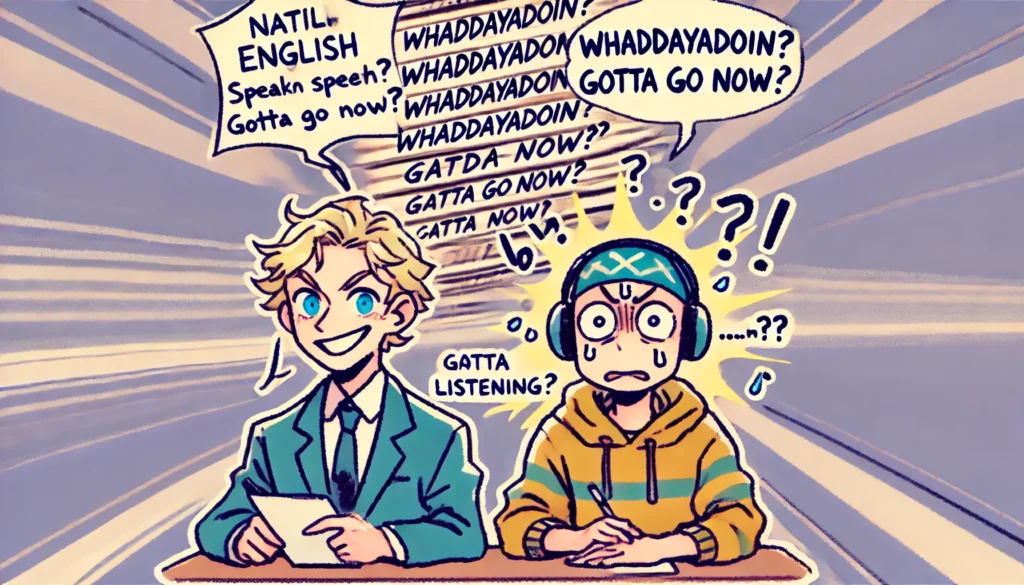
In textbooks, English is taught with clear pronunciation, like this:
“What are you doing?” (Wha-t a-re yo-u do-ing?)
But in real conversations, it sounds more like:
• “Whaddaya doin’?”
• “I have to go.” → “I hafta go.”
• “Did you eat?” → “D’jeet?”
Because sounds blend together or disappear entirely, it’s difficult for Japanese learners to recognize even familiar words in natural speech.
2. Grammar Concepts That Don’t Exist in Japanese
① The Concept of Plural Forms Is Difficult
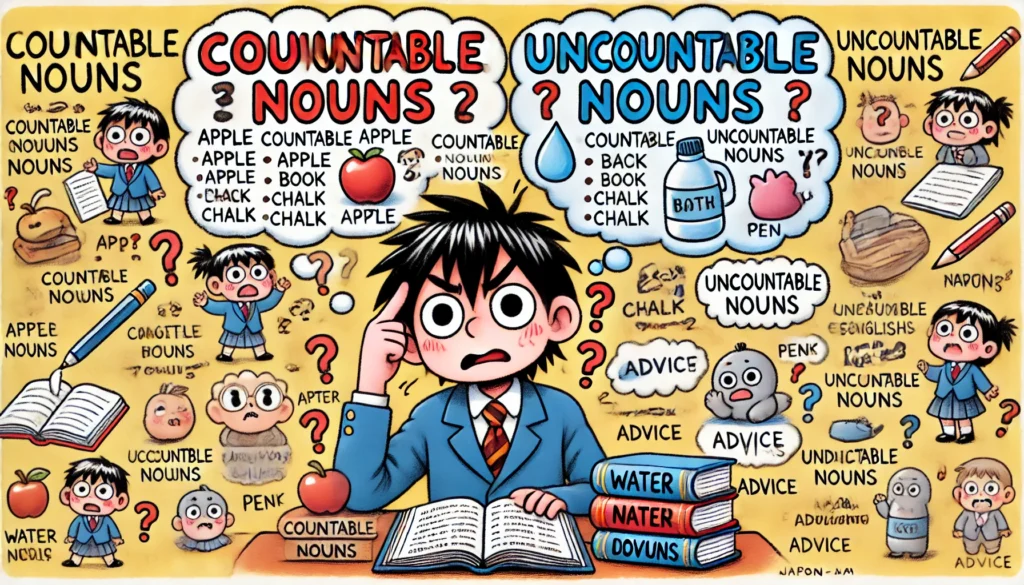
In Japanese, singular and plural forms are often not clearly distinguished.
• Japanese: 「リンゴ3個あるよ。」 (Ringo san-ko aru yo.)
• English: “I have three apples.”
This basic form of plurality isn’t too difficult to understand. However, what truly confuses Japanese learners is the concept of uncountable nouns in English.
For example, water and chalk are considered uncountable in English, meaning you cannot say “waters” or “chalks” (unless referring to different types of them). Instead, English uses expressions like “a bottle of water” or “a piece of chalk” to quantify them.
For Japanese speakers, it’s hard to grasp why some things are countable while others aren’t, making the English plural system particularly tricky.
② The Confusing Use of Articles (a / the)
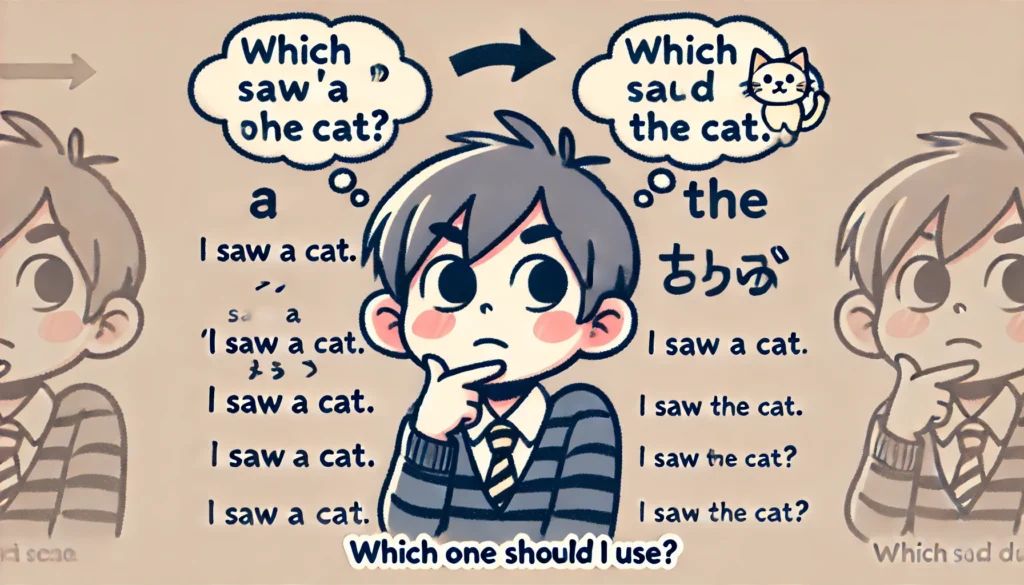
Japanese does not have definite (the) or indefinite (a / an) articles, making them one of the most difficult aspects of English grammar for Japanese speakers.
• “I saw a dog.” → Just a random dog.
• “I saw the dog.” → A specific dog we already talked about.
Since Japanese does not require this distinction, learning when to use a or the can be quite challenging.
③ English Has More Tenses Than Japanese
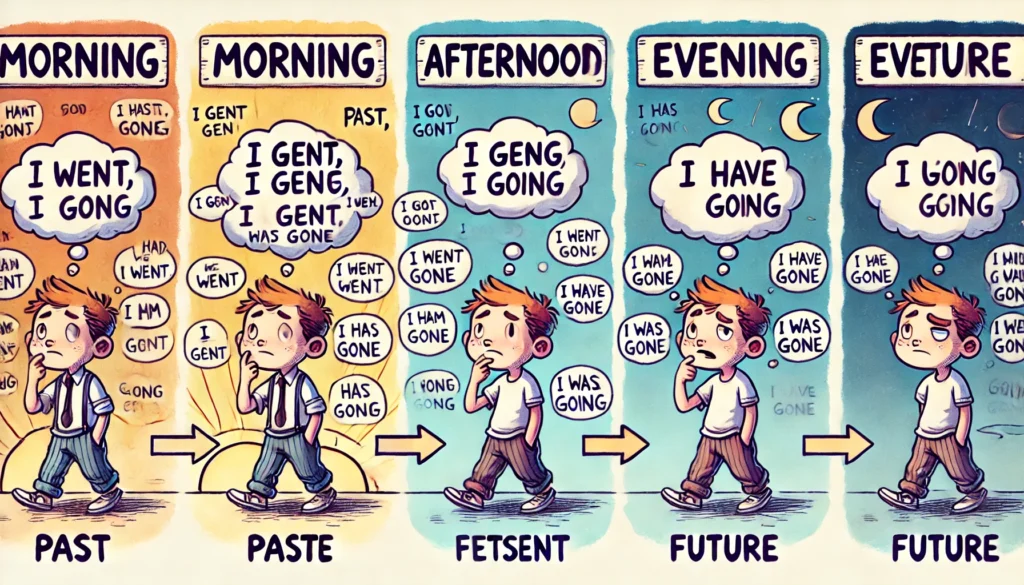
Japanese tense structures are relatively simple, but English has many different tenses.
For example, in Japanese, “I went to the library yesterday” can be said in just one way:
「昨日図書館に行った。」 (Kinou toshokan ni itta.)
But in English, depending on the context, you might need different tenses:
• “I went to the library yesterday.” (Simple past)
• “I had gone to the library before he arrived.” (Past perfect)
The past perfect tense doesn’t even exist in Japanese, making it extremely difficult for Japanese learners to use correctly.
3. English Vocabulary Is Hard to Memorize
① No Kanji to Help Guess the Meaning
In Japanese, kanji characters help learners guess the meaning of words.
• 「自動車」 → 「自 (self)」+「動 (move)」+「車 (car)」 → A car that moves by itself → automobile
• 「発電所」 → 「発 (generate)」+「電 (electricity)」+「所 (place)」 → A place that generates electricity → power plant
However, in English, words often do not provide visual clues to their meanings. For example, the following words are difficult to understand just by looking at them:
• serendipity (a fortunate coincidence)
• flabbergasted (extremely surprised)
• obfuscate (to make something unclear or confusing)
• discombobulated (feeling confused or disoriented)
Unlike Japanese, where radicals and kanji parts often hint at meaning, English requires memorization of words one by one, making vocabulary acquisition much harder.
② The Relationship Between Spelling and Pronunciation Is Unpredictable
In Japanese, words are pronounced exactly as they are written, but in English, spelling and pronunciation often don’t match.
For example, the words “through,” “though,” and “tough” all contain “th,” “ou,” and “gh,” but they are pronounced completely differently:
• through (throo)
• though (thoh)
• tough (tuhf)
Because of this inconsistency, English learners must memorize not only the meanings of words but also their pronunciations, which adds to the difficulty.
4. It’s Natural for Japanese Speakers to Struggle with English!
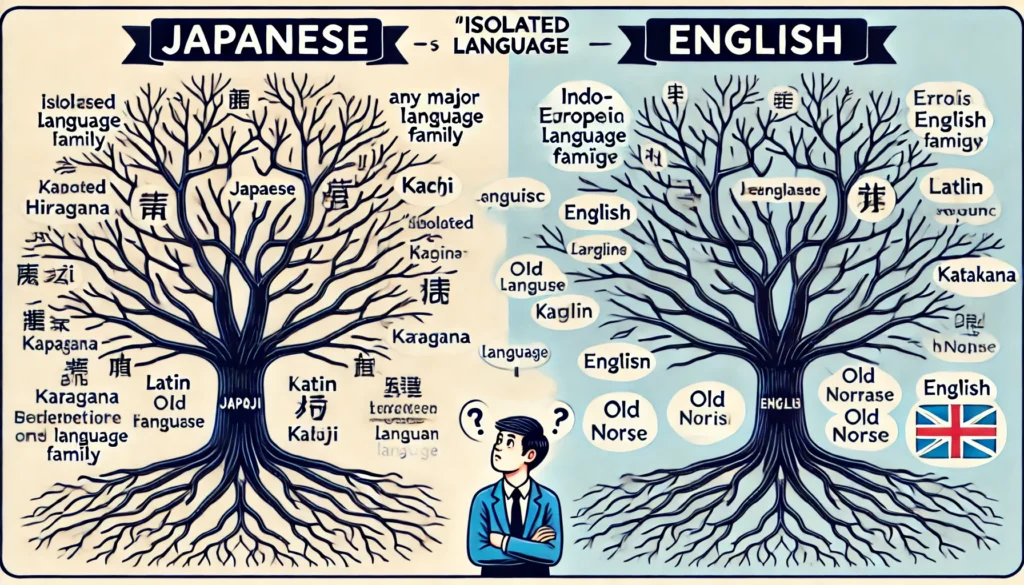
English and Japanese come from completely different language families:
• English: Indo-European language family
• Japanese: Isolate language (not related to any other major languages)
Because they share almost no similarities in grammar, pronunciation, or vocabulary, it makes perfect sense that Japanese learners find English difficult!
Conclusion
The main reasons why Japanese speakers find English challenging are:
1. Completely different sound systems (vowels, linking, different accents)
2. Grammar concepts that don’t exist in Japanese (plural forms, uncountable nouns, articles, verb tenses)
3. Difficult vocabulary acquisition (no kanji to help, unpredictable pronunciation)
If you are an English speaker learning Japanese and finding it difficult, this article may have given you some insight into how Japanese people perceive English. Language reflects the culture and characteristics of the people who speak it. Embracing these differences while learning a language can make the process even more interesting.



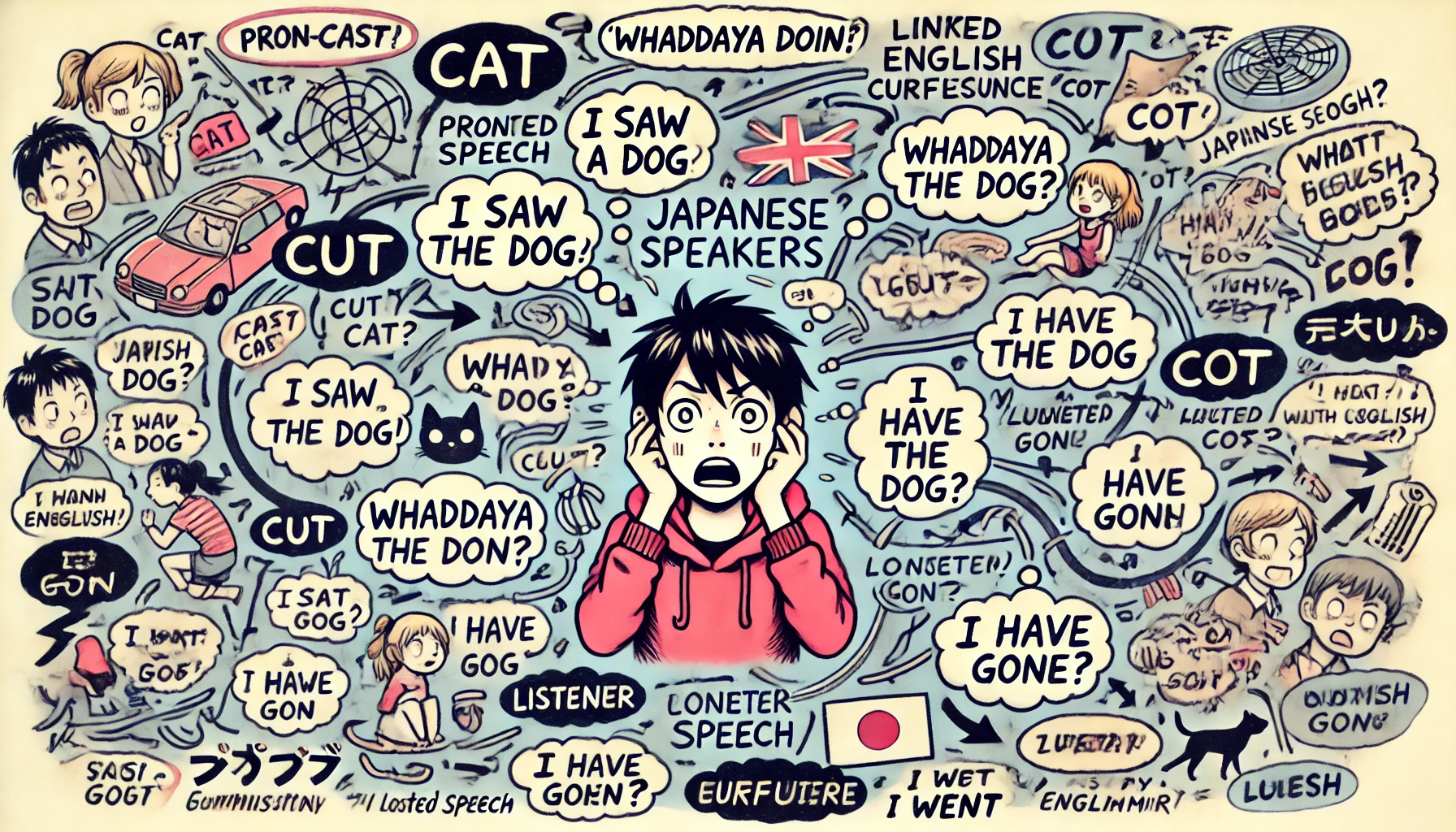


Comments